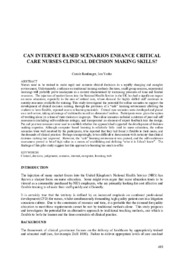| dc.contributor.author | Boulanger, Carole | en |
| dc.contributor.author | Yorke, Jon | en |
| dc.coverage.spatial | CY - Λευκωσία | en |
| dc.creator | Boulanger, Carole | en |
| dc.creator | Yorke, Jon | en |
| dc.date.accessioned | 2016-02-17T09:34:48Z | |
| dc.date.available | 2016-02-17T09:34:48Z | |
| dc.date.issued | 2003 | |
| dc.identifier.uri | http://hdl.handle.net/10797/14712 | en |
| dc.description | Περιέχει το πλήρες κείμενο | el |
| dc.description.abstract | Nurses need to be trained to make rapid and accurate clinical decisions in a rapidly changing and complex environment. Unfortunately, a reliance on traditional training methods (lectures, small group sessions, experiential learning) will probably prove inadequate in a context characterised by increasing pressures of time and limited resources. The injection of market forces into the National Health Service in the UK has had a significant impact on nurse education, especially in the area of critical care, where demand for highly skilled staff continues to outstrip resources available for training. This study investigated the potential for online scenarios to support the development of clinical decision making, through the provision of a “safe” learning environment allowing the students to have flexible, repeated access to learning materials. Critical care scenarios were developed and placed on a web server, taking advantage of multimedia to add an element of realism. Participants were given the option
of working alone (at a time of their choice) or in groups. The online scenarios included a mixture of peer and self assessment (including self-confidence ratings), and incorporated an element of expert feedback into the design. Pre and post test measures were used to establish whether the approach had supported the development of decision making expertise. Although computer based learning is relatively little used in nurse education, the online scenarios were well received by the participants, who reported that they had found it flexible to their needs, and the demands of clinical practice. Perhaps unsurprisingly, it was difficult to demonstrate with certainty that clinical decision making had improved. However, the “safe” learning environment was praised, and the self-confidence assessment proved to be of high value as a means of establishing and defining “what it is I don’t know”. The findings of this pilot study suggest that this approach to learning has much to offer. | en |
| dc.language.iso | eng | en |
| dc.publisher | Department of Educational Sciences, University of Cyprus | en |
| dc.relation.ispartof | Computer based learning | en |
| dc.rights | info:eu-repo/semantics/openAccess | en |
| dc.rights | Open Access | en |
| dc.source | CBLIS Conference Proceedings 2003 Volume I: New Technologies and their applications in education | en |
| dc.title | Can internet based scenarios enhance critical Care nurses clinical decision making skills? | en |
| dc.type | info:eu-repo/semantics/conferenceObject | en |
| dc.subject.uncontrolledterm | Clinical | en |
| dc.subject.uncontrolledterm | Decision | en |
| dc.subject.uncontrolledterm | Judgement | en |
| dc.subject.uncontrolledterm | Scenario | en |
| dc.subject.uncontrolledterm | Internet | en |
| dc.subject.uncontrolledterm | Computer | en |
| dc.subject.uncontrolledterm | Learning | en |
| dc.subject.uncontrolledterm | Web | en |
| dc.contributor.conferenceorganizer | Learning in Physics Group, University of Cyprus | en |
| dc.contributor.coordinator | Constantinou, Constantinos P. | en |
